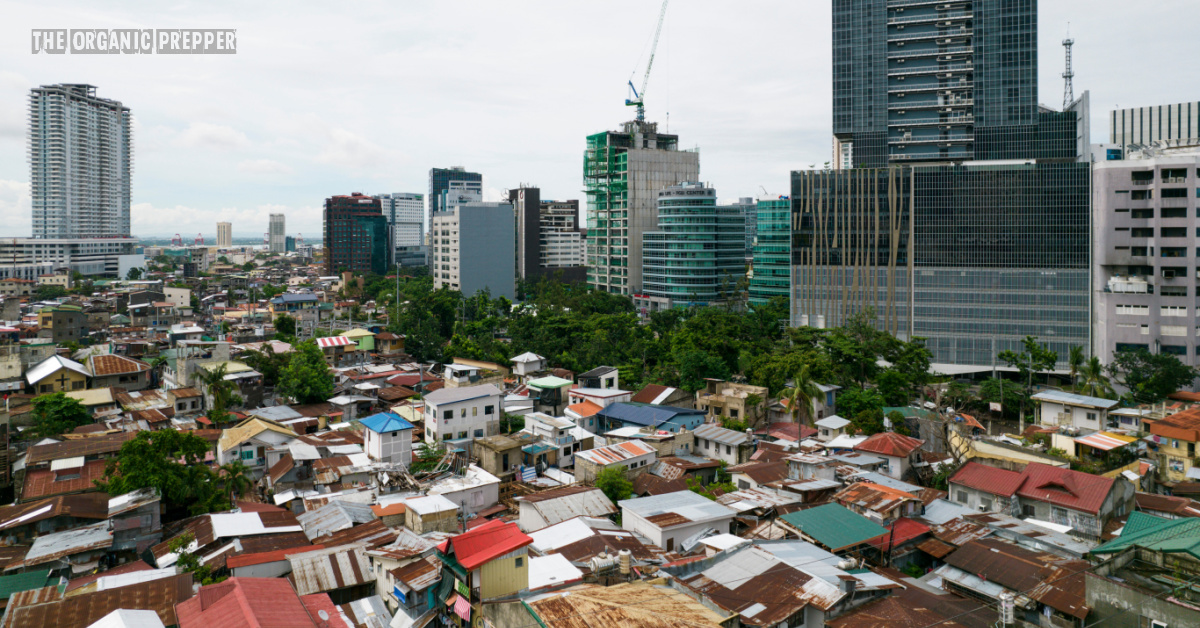(Psst: The FTC wants me to remind you that this website contains affiliate links. That means if you make a purchase from a link you click on, I might receive a small commission. This does not increase the price you’ll pay for that item nor does it decrease the awesomeness of the item. ~ Daisy)
By the author of Street Survivalism: A Practical Training Guide To Life In The City and The Ultimate Survival
The wealth gap is growing in the West. Objectively, it goes up and down following economic boom and bust cycles, so on the surface, that shouldn’t be worrying. However, a combination of alarming factors is compounding and making that a more serious issue this time around.
The signs and consequences of that acceleration are everywhere: the explosion of homelessness, crime, and social unrest accompanied by the escalation of oppression, regulation, taxation, bureaucracy, and infrastructure decay. Not to mention mass illegal immigration, a threat that’s now coming to a head in the streets of the EU, the UK, and the USA.
Not everyone is paying attention to the issue, mostly because it’s a slow process that happens in the background. But they also aren’t noticing because governments are actively trying to gaslight the population. And from those who are aware, only a few are concerned or know what this means for advanced societies, for their standard of living, and even for the relationship between nations.
Only a few leaders have the courage to address the matter openly, or do something about it.
Perhaps the best example is El Salvador’s president Nayib Bukele, who delivered a great speech during the recent UN meeting. It was the event’s most honest and courageous presentation, typical of a true statesman. It doesn’t matter much what you or I think of him. The guy has turned one of the most violent and deadly countries in the world into one of the safest in just a couple of years.
As he noted, after decades of conflicts, poverty, and violence, Salvadorans are now enjoying a much better standard of living and quality of life. Thousands got jailed for that to happen, but what matters is that now the majority – the honest part of the population – is free to work, advance, and enjoy their beautiful country.
Not everyone sees it that way, and some say he’s a “threat to democracy.” That idea has been abused by both sides of the political spectrum, to the point of turning it empty and meaningless. But facts speak louder than words: his people love him, and that’s the true measure of a leader’s success.
Argentina’s Javier Milei is another president who seized the opportunity to denounce the dangers of socialism, wokeism and corruption taking over the First World, and criticize governments turning the screws on liberty while printing money at large. The situation in Argentina is still bad, but it’s improving slowly and trending up thanks to Milei’s policies. Again, facts speak louder than words.
I’m sure that has many of us wishing one of them was the president of our country.
I do, and speaking of the devil, Brazil’s leftist and ex-convict president went the opposite direction with his populist, retrograde, and worn-out discourse. Lula missed the opportunity to denounce the stolen elections and the atrocities being committed against the population and the opposition in Venezuela in his opening UN speech.
Instead of addressing the political and humanitarian crisis taking place within his area of influence, the delusional leader ticked all the globalist agenda, from climate change to the conflict in Palestine, from internet regulation (i.e., censorship), world hunger, to the UN’s Security Council, among other crap completely out of his competence.
His discourse was mediocre, shameful, pathetic, and cynical, a direct contrast to his colleagues from El Salvador and Argentina. But that’s Lula, and Bill Gates’ foundation awarding him a prize for “humanitarian achievements” only makes things worse and tells us the rest we need to know about this whole clown theater.
Back to the topic, what stood out in Bukele’s speech is the part where he warns other leaders about the path much of the world is taking towards Thirdworldization.
Those who follow my work in preparedness know it’s based on that idea, which is the declining standard of living going on in much of the Western World. It’s happening, and Bukele showed how El Salvador is making an effort in the opposite direction by fighting for freedom, a free market, and a safer society.
Bukele was very humble and down to earth, acknowledging El Salvador is small and doesn’t have much power to change things, but the results achieved can serve as an example. I must say it won’t happen, unfortunately, for all the wrong reasons with one being the level of corruption running deep into the system. So you better prepare for what’s coming.
A small wealth gap is a characteristic of a First World country, and vice-versa.
Every country has the one percenters at the top, and also a minority of miserable and dispossessed. However, in an advanced and wealthy nation the majority of the population situated between these extremes enjoys a decent standard of living: decent, well-cared-for and safe neighborhoods, access to good education, basic healthcare, and material goods (such as a house and a car or two).
That was the standard of living of previous generations, but today, it’s getting harder for the majority to even pay the bills. The first-world middle class is getting crushed. Thanks to inflation (money printing) and the Cantillon effect, the concentration of wealth in the hands of those already well-positioned and close to the printing presses is happening at a dangerous pace.
Working, saving, and investing doesn’t cut it anymore, so too many resort to shortcuts – gambling in the stock market, bitcoins, betting sites, OF, etc. – ways to try and accumulate some wealth as quickly as possible. Everyone sees the writing on the wall and is trying to front-run the inevitable.
A growing wealth gap also begets the loss of freedom: governments and authorities must keep the population under control. No one likes to feel they’re being scammed. That’s exactly what’s happening and what Bukele brought up and criticized in his speech.
I’ll use my country as an example to illustrate how pernicious and damaging a large wealth gap can be.
Brazil is a big country blessed with fair weather, diverse territory, abundant natural resources, and mostly devoid of significant natural or geopolitical threats. However, much of those favorable conditions and potential get squandered by a mix of backward mentality, corruption, bureaucracy, poor education, low productivity, and more. That keeps the wealth and privileges concentrated in the hands of too few and too many trapped in poverty, ignorance, and a quotidian of instability, degradation, and violence.
Admittedly, these deficiencies exist everywhere. But I’m talking about extreme concentration resulting in huge inequality, something damaging and hindering in ways that are hard to explain. It makes attaining sustainable progress or achieving a solid social contract next to impossible.
At one point, this perverse contrast can push a society into what I call “soft survival mode,” a rat race. While not an out-and-out fight, everybody ends up doing what it takes instead of what is right, moral, or what contributes to the advancement and prosperity of the collective. Anger and resentment build between all classes, dividing and polarizing people even further.
Final thoughts
When the wealth gap grows too big, Thirdworldization tends to accelerate and aggravate. Everyone ends up getting touched one way or another. However, not everyone is impacted the same. The upper brackets of society are able to preserve their lifestyle. At the same time, the middle and lower classes get crushed and experience a big drop, with a large number being thrown into misery.
Objectively, despite the growing wealth gap, I don’t foresee the US, Canada, or Western Europe becoming as dysfunctional as a Third-World country. I know both realities and their differences well enough to affirm that. It’s possible, however, and even though things are bad already, they will get worse in the near future.
I should also add that it sounds darker in prospect than it is in reality. I’m not making light of it, but citizens of the First World may feel the fall from grace more than the actual consequences of it. We’ll see, but either way, life goes on, and a normal and fulfilling life is perfectly possible during crises, even through wars or other SHTF.
Finally, for long-lasting crises such as Thirdworldization, adaptation works better than preparation. So my advice is, prepare to adapt.
Have you seen evidence of this?
Have you seen evidence of the wealth gap in your area? Are people struggling more than they used to? Is safety degrading? What about the infrastructure?
Let’s discuss it in the comments section.
About Fabian
Fabian Ommar is a 50-year-old middle-class worker living in São Paulo, Brazil. Far from being the super-tactical or highly trained military survivor type, he is the average joe who since his youth has been involved with self-reliance and outdoor activities and the practical side of balancing life between a big city and rural/wilderness settings. Since the 2008 world economic crisis, he has been training and helping others in his area to become better prepared for the “constant, slow-burning SHTF” of living in a 3rd world country.
Fabian’s ebook, Street Survivalism: A Practical Training Guide To Life In The City , is a practical training method for common city dwellers based on the lifestyle of the homeless (real-life survivors) to be more psychologically, mentally, and physically prepared to deal with the harsh reality of the streets during normal or difficult times. He’s also the author of The Ultimate Survival Gear Handbook.
You can follow Fabian on Instagram @stoicsurvivor

















